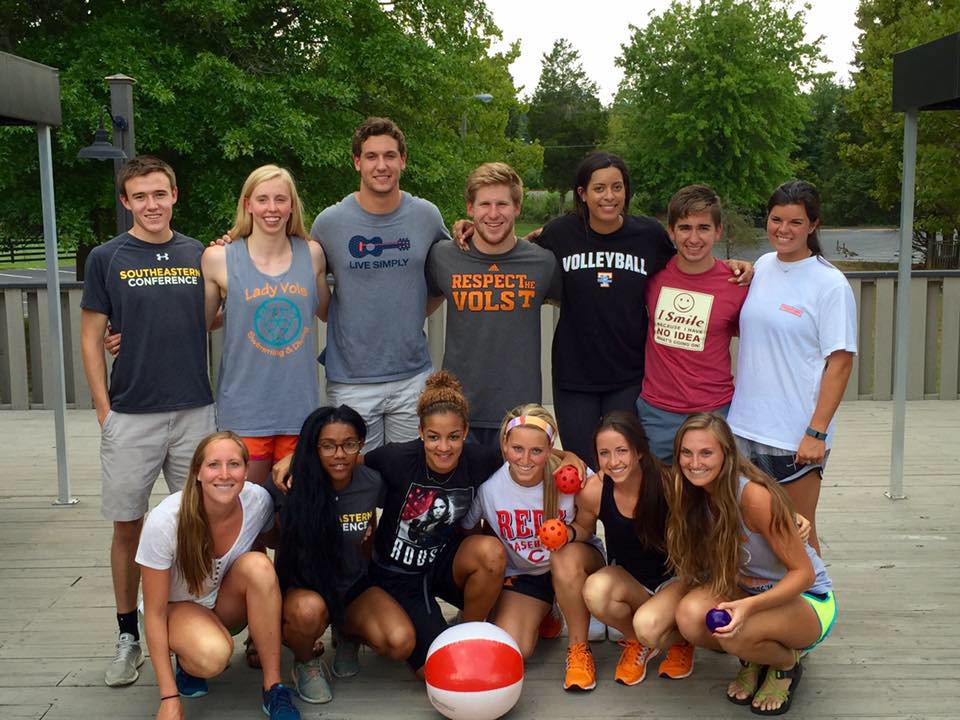
The 2015-16 VOLeaders Academy class
By Janine Al-Aseer, CSPS Research Assistant & PhD Student
As we reflect on the legacy of Martin Luther King Jr., we are reminded of a long-standing commitment to service for the community. MLK Day of Service is a transformational time to empower our communities with the spirit of Dr. King’s life and teachings. Accordingly, today over 200,000 Americans are anticipated to contribute their time toward service projects around the country.
At the Center for Sport, Peace, and Society (CSPS), our team understands, endorses, and contributes to service-learning projects locally, domestically and internationally. Service-learning in the sport-related disciplines is sometimes confused with community service. Although both are incredibly valuable in varied settings, service-learners are change agents and have a distinct responsibility to engage and support the community, while also remaining respectful of local culture. This requires a delicate balance between the traditions and needs of the community and the academic knowledge of the service-learners.
Regard for local culture is a cornerstone of our practice. Traditionally working with international audiences, the Center has hosted more than 275 women on sports-based exchanges with goals of advancing the rights and participation of women on a global scale. This involves careful navigation of cultural issues in diverse contexts. Relatedly, the Center simultaneously engages University of Tennessee (UT) students at a local level in service-learning opportunities that grow their intellectual, interpersonal, and leadership capacities.
Last semester, the Center partnered with UT’s Center for Leadership and Service and the Department of Athletics to engage our campus community with service-learning through the VOLeaders Academy. This program consists of hand-selected, principal student-athletes who participate in curricula surrounding the impact of service in the community. Principal student-athletes, or VOLeaders, learn how to positively impact their team while using their passion of sport and their influence to enact positive change that transcends athletic success.
Leadership development was the focus during the fall VOLeaders Academy class. VOLeaders continue with the academy this semester in a Sport for Social Change course, shedding light on how to use their positions of athletic prominence for community good. The final piece of the VOLeaders academy is a 10-day service-learning opportunity in Brazil, assisting communities in preparation for the 2016 Rio Olympic and Paralympic Games.
At the Center, we understand that service-learning must be enacted as a reciprocal relationship between the university, the student practitioner, and the community itself. By allowing communities to choose issues that are important and relevant in their own cultural contexts and providing them with safe spaces to brainstorm possible solutions, community participants can perceive themselves as empowered solution-makers. It is our hope that service-learning can be used in wide application to raise successful—and culturally sensitive—programmatic execution for this year’s VOLeaders Academy class.
Just a few days ago the VOLeaders academy was awarded the NASPA 2015-16 Gold Award for outstanding contributions to the transformation of higher education through exceptional programs, innovative services, and effective administration. We know that receiving this award is just a small indication of the amazing work that is to come from our servant leaders.
We truly look forward to seeing how our first VOLeaders Academy class impact their communities both locally this semester and in Brazil this summer. We know they will do great things—for their team, their school, and for others. As you reflect on MLK day and its long history of service, keep in mind the words of Dr. King, “Life’s most persist and urgent question is: What are you doing for others?”